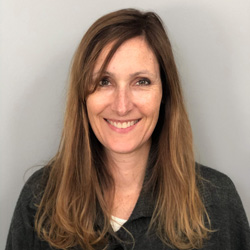
Dr. Rebecca Draper ’20
Roberts Wesleyan University, Assistant Professor, Department of Social Work
Prepare to deliver effective, evidence-based psychological services in a variety of settings with the Doctorate in School/Clinical Psychology (PsyD) program. This innovative curriculum blends the professional areas of clinical and school psychology in a programmatic sequence of courses, culminating in the completion of a dissertation that addresses an issue relevant for the professional practice of clinical/school psychology.
Do you need questions about the program and the admissions process answered? Reach out via email at age-admissions@roberts.edu or schedule an appointment with our Adult & Graduate Enrollment Representative.
The Doctor of Psychology program holds classes on the campus of Roberts Wesleyan University in North Chili, NY. Limited housing accommodations are available to students requiring lodging for the duration of the degree program.
Get More Info by clicking below to request details on our program admissions, curriculum, tuition, and more.
COURSE LENGTH
15-week semesters
PROGRAM DURATION
60 months full-time
CLASS SIZE
20 students
Graduates from Roberts Wesleyan University with a Doctor of Clinical/School Psychology (PsyD) degree are trained to address today’s mental health challenges by utilizing skills in assessment, diagnosis, counseling and therapy, consultation, and supervision. Graduates from the PsyD program are working in a variety of settings, including hospitals, schools, outpatient mental health clinics, private practice, and universities/colleges.
Our Doctor of Clinical/School Psychology program is unique in that each student is equipped to work in a wide variety of careers in psychology. The program meets educational requirements for licensure as a Psychologist and provisional certification as a School Psychologist in New York State.
ACCEPTED STUDENTS Receive a $30,000 Scholarship
PRACTICUM EXPERIENCE Beginning in First Year
PROFESSIONALLY ACTIVE Faculty in Their Fields
100% OF STUDENTS are Employed Full-Time within a year of graduating
LARGE NETWORK of Practicum sites
SPECIALIZED TRAINING to Work with Religious and Spiritual Issues that Relate to Mental Health
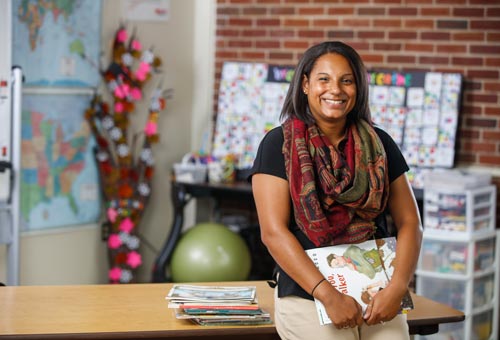
The Doctoral Program in Clinical/School Psychology follows a practitioner-scholar training model that prepares students for the professional practice of psychology across a wide range of settings, populations, and clinical and educational issues. The program specializes in preparing students to work with children, adolescents, and young adults, but provides training opportunities across the lifespan. Faculty teach from a developmental curriculum that fosters the acquisition of foundational knowledge and professional competencies, including:
Knowledge in Scientific Psychology
Students will attain scientific knowledge that provides a foundation for professional practice, including the affective, biological, cognitive, developmental, and social aspects of behavior, history and systems of psychology, research methods, statistical analysis, and psychometrics.
Additionally, each student learns systems of psychology, psychological measurement, research, and statistical methods. Our graduates will develop the skills necessary to conduct their own psychological research.
Professional Competencies
Students will attain the necessary profession-wide competencies for the practice of psychology, including competencies in ethical and legal standards, individual and cultural diversity, professional values and attitudes, communication and interpersonal skills, assessment, intervention, supervision, consultation, and interprofessional/interdisciplinary skills.
Research Competency
Students will complete a dissertation in which they conduct an original research project related to the applied practice of clinical or school psychology. Applied research projects have pragmatic goals of addressing practical problems with insights drawn from psychological science. The focus on using research to inform and improve services to vulnerable populations is consistent with the mission of our PsyD program.
Evidence-Based Practice
Faculty members are trained in a variety of theoretical approaches, including cognitive-behavioral, psychodynamic, family systems, and person-centered approaches. Our curriculum provides instruction in these modalities and promotes an attitude of respect and value for empirically-supported treatments from all orientations. From this foundation, students are encouraged to develop their own approach that integrates the best available research with their clinical expertise in the context of client characteristics, culture, and preferences.
Practicum and Internship Experiences
Students spend a significant portion of time in practicum and internship settings where they utilize and develop the knowledge and competencies introduced in coursework. The program has a full-time Field Director who works with students to plan, organize, and support these important professional experiences in an extensive network of practicum partners. Settings include hospitals, mental health clinics, schools, forensic settings, neuropsychological institutes, college counseling centers, children’s residential centers, VA centers, and more.
Flexible Career Options
The program utilizes a combined-integrated model, as delineated by the Council of Directors of Combined-Integrated Doctoral Programs in Psychology. A unique feature of this curriculum is that the disciplines of school psychology and clinical psychology are integrated throughout the coursework, and students have practicum experiences in both clinical and school settings. In addition to providing a more holistic understanding of the clinical and educational needs of individuals and families, this training provides graduates with great flexibility in potential career paths.
Additionally, students from Roberts Wesleyan University benefit from highlights in the PsyD program, including:
Residency + Internship: 4 years of residency at Roberts Wesleyan University, followed by one year of internship.
American Psychological Association (APA) Fully Accredited through November 26, 2033.
Collaborative, Supportive Relationships Among Faculty and Students.
For additional campus information, student curriculum, academic requirements, and faculty information contact psyd@roberts.edu or call (800)777-4792 today.
Those who earn their PsyD from an accredited college/university open themselves to many new and unique employment opportunities. A key advantage of a combined/integrated training program is the versatility of career paths afforded. PsyD graduates from Roberts Wesleyan University have found employers across New York State in settings including:
Careers
Employers
With an average job outlook of 3%, positions in psychology continue to grow across many industries for a wide range of applications. Students with combined/integrated training program experience are prepared to handle the many different career paths available.
According to the U.S. Bureau of Labor Statistics, of the 192,300 psychology jobs that were held in 2019, around 171,500 of them were related to clinical and educational industries. Over 31% of psychologists were self-employed, while others worked in elementary schools, secondary schools, ambulatory healthcare, and hospitals.
Source: Bureau of Labor Statistics, U.S. Department of Labor, Occupational Outlook Handbook, Psychologists, at https://www.bls.gov/ooh/life-physical-and-social-science/psychologists.htm (visited March 04, 2021).

Dr. Rebecca Draper ’20
Roberts Wesleyan University, Assistant Professor, Department of Social Work
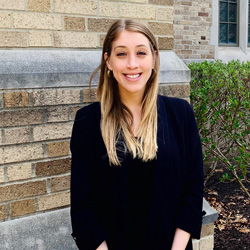
Dr. Julia Vitale ’20
Genesse Valley Psychology Post Doc
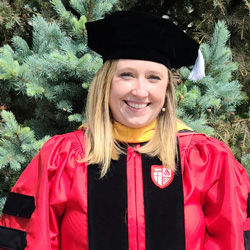
Dr. Kristi Kohl ’20
Webster School District
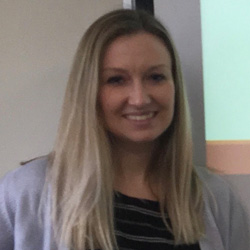
Dr. Alyana Davison ’20
LOSATS (Linden Oaks Specialized Assessment and Treatment Services)
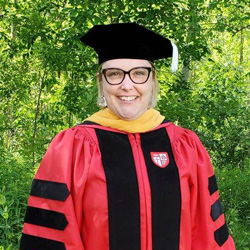
Dr. Alysa MacMillen ’20
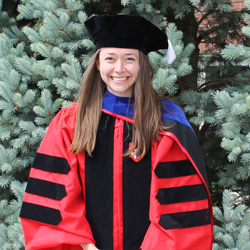
Dr. Vanessa Komerak ’20
Webster School District
A PsyD is a Doctor of Psychology, whereas a PhD is a Doctor of Philosophy. Both degrees prepare students for a wide variety of careers in the field of psychology. PsyD programs focus on preparing students for the professional practice of psychology, and thus have a greater emphasis on clinical and professional training. PhD programs focus on preparing students for academic and research careers in psychology, and thus have a greater emphasis on research training.
We are a combined program that integrates training in both school and clinical psychology. We have no tracks, but rather all students cross-train in both clinical settings and school settings. Children and adolescents who have mental health concerns also have educational needs, and the school and medical systems work very differently. Regardless of whether students end up working in schools or medical/clinical settings, it is very helpful for practitioners to understand both systems in order to be able to work effectively with families and address children and adolescents holistically. This is a unique strength of our program.
Yes, our coursework spans the entire lifespan, and we have practicum sites that focus on people of all ages. Because we are a school/clinical program, all students will work with children or adolescents at some point in their training, and we include significant instruction regarding children and adolescents, as this is our specialty. Therefore, students should have at least some interest in children/adolescents. However, many of our students choose to focus their training mostly on work with adults and secured employment working with adults.
Yes, the program is full accredited by the American Psychological Association (APA) through November of 2033, as well as the National Association of School Psychologist (NASP) through August 2030.
We evaluate candidates holistically, and do not use cut-off scores. All pieces of the application are considered for every student, including GPA, GRE scores, experience, recommendations, and statement of student’s interests. We are looking for students who have promise of success and who fit with our program’s focus.
Students may work part-time, but it is not possible to work full-time while in the program. Students carry a full course load in addition to 1-3 days per week in a practicum setting (depending on the program year).
No, we do not have a part-time option for our Doctoral program. We do have part-time options for our Masters program in School Psychology.
All students who are accepted into the program will receive a $30,000 scholarship, to be distributed over the first two years of the program. In exchange, students serve as graduate assistants in their second year, mentoring first-year students in assessment.
Practicum experiences are not paid. We have developed partnerships with some local school districts that provide paid school psychology internships during the third year of the program, which are available on a competitive basis. The pre-doctoral internship in the fourth year is fully paid if students apply and attain an internship through the Association of Psychology Postdoctoral and Internship Centers (APPIC).
New York State does not allow psychologists (PsyD or PhD) to prescribe medications. Because of their medical training, psychiatrists can prescribe medications, which is one of the distinctions between these fields. A few states do allow psychologists to prescribe a limited number of psychiatric medications if they complete additional course work in psychopharmacology.